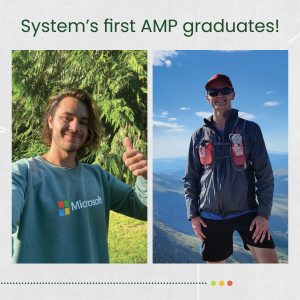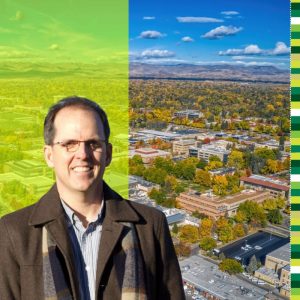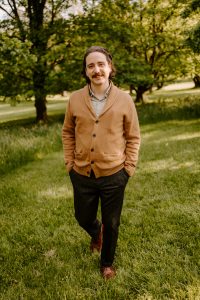
Vincent “Vinnie” Paglioni is our newest assistant professor of systems engineering! Paglioni is poised to enhance our academic community with his specialization in understanding risk in complex systems that involve human actors. He has a background in nuclear engineering and a Ph.D. in Reliability Engineering from the University of Maryland.
To provide our students and partners with an introduction to Paglioni, we sat down with him for a candid conversation. Read on as we discuss his background, expertise, and vision for the future.
The following Q&A was edited for length.
What inspired you to pursue a career in academia and teaching?
I had a couple of opportunities when I was in undergrad to go back to my old middle school or my old high school, kind of one-off lectures on nuclear power. I loved it, one of the best experiences I had in undergrad, being able to share knowledge. Right away, I knew that at some point I wanted to be in an instructional role. After graduating undergrad, I worked for two years for the US Navy as a civilian, but it just wasn’t what I was hoping for in a job. At that point, I thought, well, I did enjoy research and undergrad. I really like teaching. How can I combine those two? That’s the job of a professor, right?
When I went to grad school, I didn’t have the rose-colored glasses that might have led me to expect a professorship. I anticipated, okay, it’ll be a couple of years, maybe I’ll have to go back into industry before I’m ready. But in the last year, I decided to just go for it. I figured the worst they can say is no, and someone happened to say yes. It’s been fantastic so far. My sister also had a lot to do with it because she’s a professor, my parents had a lot to do with it, and then it’s just something that I knew I wanted. My wife Jenny has always been incredibly supportive, and she really pushed me to pursue what I wanted for myself.
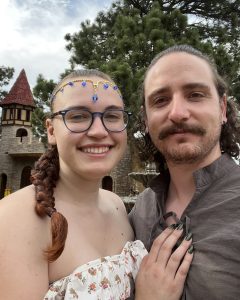
How do you intend to engage and inspire students in your classes?
I found the best way to kind of reach students is to pique their interest in something, right? Especially as systems engineers, nothing I talk about in risk analysis is tied to a specific domain. I can fill my lectures with nuclear engineering examples, and it’ll certainly keep me engaged. But if it doesn’t resonate with the students, it won’t matter. They might complete the work, but they won’t have the excitement and engagement I aim for.
When I begin a course, I like to understand why students are here and their backgrounds. Knowing different majors and outside interests allows me to tailor the lectures accordingly. For instance, if we have many aerospace students, I’ll seek out more aerospace examples. This tailored approach helps to maintain student engagement and ensure they stay invested in the course. I want to make my courses meaningful and quality experiences for my students, and I think that fits well with CSU’s mission.
Could you elaborate on your primary research interests and any ongoing or upcoming projects?
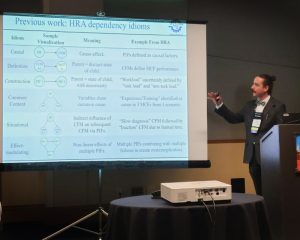
I’m the principal investigator for a research group focused on understanding risk, reliability, and resiliency within systems. Our research umbrella covers any industry, but our focus is on critical infrastructure.
My interest lies in understanding the inherent risks within critical infrastructure and improving their operations for enhanced safety, reliability, and efficiency. Specifically, I’m focused on examining human involvement in these systems, a critical factor given that humans contribute significantly to both industrial accidents and accident avoidance. Sure, they might cause you some troubles, but they can also save you.
Looking ahead, we have some exciting projects in the pipeline. One major project is the development of a nuclear power plant’s main control room simulator, a fully touch screen digital setup for testing human errors and recovery processes. This project could be conducive to education and outreach, providing a hands-on experiment opportunity for engineering classes and a means to engage middle school and high school students. It’s a promising tool to enhance engagement and understanding of nuclear power and science. I’m really excited to see that project take off.
How do you see yourself contributing to the local community outside of your academic role?
Outside of my academic role, I genuinely believe my job here is to use what I know to enhance the community. I want my contribution to Fort Collins to involve outreach to school systems across Larimer County. There are many opportunities to offer students access to education, whether on CSU’s campus or through visits to high schools and middle schools. Engineering is for everyone, and that’s an essential lesson I bring with me from my upbringing.
I also aim to elevate the discourse around energy for Colorado, not solely pushing for nuclear power, but contributing to increased energy efficiency and advocating for electric vehicles. I know it’s vital to highlight that electric vehicles aren’t a perfect solution if the base power source remains carbon-based. The potential for positive impact is vast, and I’m eagerly anticipating what the next years will bring. In just three months, my wife Jenny and I have grown to love Fort Collins. We find ourselves wondering why we didn’t move here sooner, and I’m eager to contribute to making this community an even better place in any way I can.
What aspects of the campus or community are you most excited about experiencing?
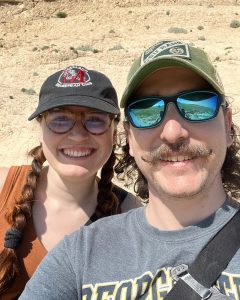
I really like Ramskeller. Maybe that’s not the best example to use, but I think that’s a cool experience to have as a student, right? To have a safe place to go and grab a beer for a reasonable price is awesome. And for these students, they get to make the beer. That’s amazing! That’s an awesome experience that doesn’t happen just anywhere. So I think that my perception after being here for three months, well, two months on campus, is that CSU really cares about the students, and that’s something special.
But what I’m most excited about is engaging with the students at the graduate level and at the undergraduate level. I’m really looking forward to proposing a class that I can teach, like upper-level undergrads, or going into the engineering 100 classes and saying, hey, you know systems is here. We’re a great program to consider! Consider staying on for a graduate education if you really want. Look at all the topical areas you can delve into. I mean, I’m very excited to engage with the students. That and football! I’m a huge, huge college football fan.
How do you envision leaving a lasting impact on your students and the institution?
That’s something I struggle with, right? It’s the type of question that keeps you up at night. When you’re sitting down to fall asleep, you think, ‘Oh crap, what have I done today that’s gonna help my students?’ To a certain degree, I trust that having that kind of anxiety is a good thing, because it means I’m concerned, at the least.
I hope my impact will be to give my students a valuable experience. They should be able to do the research they enjoy, take the classes they were interested in, and move on to fulfilling careers based on their own definitions of fulfillment. At the end of the day, I want my students to leave with great degrees that set them on a path to happiness.
I aim to propel the legacy and impact of the CSU Department of Systems Engineering forward. We’ve established a solid position at the school. If I can improve our impact through research by bringing in more funding and exciting projects, that’d be fantastic. My goal is to contribute my perspective to various committees on campus, such as hiring committees, DEI, and student-oriented committees. I hope to guide the institution in the direction I believe it should go. From what I have seen, it’s already going in a great direction. So, I’m aiming for a dual impact on research and leadership.
I want this university to be the go-to place for systems engineering. When I attend a conference representing Colorado State, with my CSU shirt and tie, I want people to come and seek me out, even if they don’t know who I am. I don’t care if they know me. What matters is that they see Colorado State and recognize an important presence in the room. Especially in the realm of risk and reliability, the field is open, and I believe Colorado State is on its way to becoming the go-to place. If people are seeking an expert to speak on risk, I want to be that person. I want to be seen as someone who is accessible and genuinely helpful. Establishing a reputation as someone who will actually be helpful to people would be fantastic.
Are there particular skills or qualities you believe are essential for success in academia and beyond?
I think that to succeed academically, the biggest factor in my opinion is you have to love what you do. Someone once asked me ‘what’s the easiest PhD?’, and I said there is no such thing as ‘the easiest PhD.’. It is something that you’re interested in, right? You can make all the jokes you want about PhDs in other fields, but if you don’t love what you do, it’s going to be just as difficult as it would be for someone who doesn’t love systems engineering coming to this field. So, I think the most important thing is you have to have a genuine interest in what you’re doing.
The second piece is you have to be willing to learn and to be put into situations where you are suddenly very aware that you don’t know everything. That’s a good thing because it means that you have a lot of open space in front of you. So, I think those are the two biggest factors by far: having the genuine interest, the genuine passion for what you’re doing, and the willingness to learn.
What do you want students thinking about taking your course to know about you as an instructor?
What students need to be successful in my class is basically the same two things: have a genuine interest in the material and be willing to learn, to put in the effort. A good background in statistics always helps, but I think the biggest piece is you have to be willing to learn.
I feel like I’m pretty upfront with my students that look, I’m not necessarily an expert in every facet of the class that I’m teaching, right? I have a module on environmental risk analysis. I’ve never done environmental risk analysis, so I’m right there learning with them. Hopefully, what my students get out of that is that no one is ever done learning. If the professor doesn’t know everything, then they sure as heck don’t know everything, and they better be studying.
Also, having a good background in statistics helps. I think for anything that you do, a good background in statistics gets you a long way.



